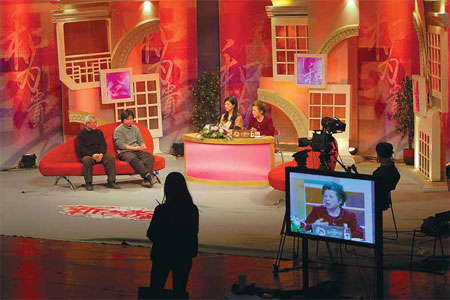 |
|
A scene from New Old Uncle, one of the most popular TV programs in Shanghai, which until recently was presented in the local dialect. Gao Erqiang / China Daily |
Television show's change of language sparks controversy, reports Xu Junqian in Shanghai.
The term Lao Niang Jiu, or "old uncle", a well-known character in Shanghai folklore, is frequently used by the city's residents to describe prying busybodies who are always ready to meddle in other people's affairs.
Now, though, Shanghai's best-known and most-meddlesome "old uncle" has switched to using broken Mandarin, rather than his signature colloquial and idiomatic Shanghai dialect, when interfering in family affairs.
In 2008, New Old Uncle, a TV program named after the character and produced by Shanghai Media Group, was first aired by a local channel.
It was an immediate success. The initial 30-minute program, later extended to an hour, features two sides - usually from the same family - attempting to resolve a dispute. The warring factions are overseen by an amateur mediator, usually an experienced meddler from the local community.
The program is especially popular among housewives cooking the family dinner. The star mediator, Bai Wan-qing, ironically a 60-something aunt rather than an uncle, has even been dubbed "China's Oprah Winfrey".
But the program, one of Shanghai's most popular local products along with the city's soup dumplings, is losing its local flavor because of the change from the Shanghai dialect to Mandarin.
In early January, the State Administration of Press, Publication, Radio, Film and Television, issued a notice stating that all TV and radio programs must use Mandarin and should avoid dialects and foreign languages. The measure was aimed at further promoting the use of Mandarin, or putonghua ("common speech"), and regulating the use of alternative languages on TV shows.
Disappearing dialects
It's not the first time the country's media regulator has prescribed a favored language for use on TV and radio. But the notice, like a stone thrown into still waters, has produced many ripples and sparked heated discussion about China's rapidly disappearing dialects.
In a phone interview, Yin Qingyi, the producer of New Old Uncle, denied that the change of language on the most-watched TV program in the southern metropolis came in response to the official notice. Instead, Yin called it "a reflection of reality".
 |
 |
 |
 |
| Learn SH Dialect | Learn SH Dialect | Learn SH Dialect | Learn SH Dialect |
